Throughout the year, you can cultivate plants that soothe anxiety and promote relaxation. In spring, plant calming florals like lavender and chamomile. Summer's aromatic herbs, including lemon balm and holy basil, offer natural stress relief. Fall's root vegetables provide grounding effects and nourishing meals. During winter, create an indoor zen garden with succulents for mindful meditation. Year-round, incorporate anxiety-reducing greenery like snake plants and aloe vera. Practice mindful gardening techniques to enhance the therapeutic benefits. By connecting with nature through planting and harvesting, you'll discover a wealth of natural remedies to ease your mind and uplift your spirits.
Key Takeaways
- Plant lavender in spring and summer for its calming scent, anxiety-reducing properties, and sleep-promoting benefits.
- Grow chamomile in spring and summer to brew relaxing tea and create a peaceful garden atmosphere.
- Cultivate root vegetables like carrots and potatoes in fall for grounding effects and stress-relieving harvesting experiences.
- Create an indoor zen garden with succulents and rocks in winter for a meditative, anxiety-reducing activity.
- Incorporate year-round anxiety-reducing plants like snake plants and aloe vera for consistent stress relief indoors.
Spring's Calming Florals
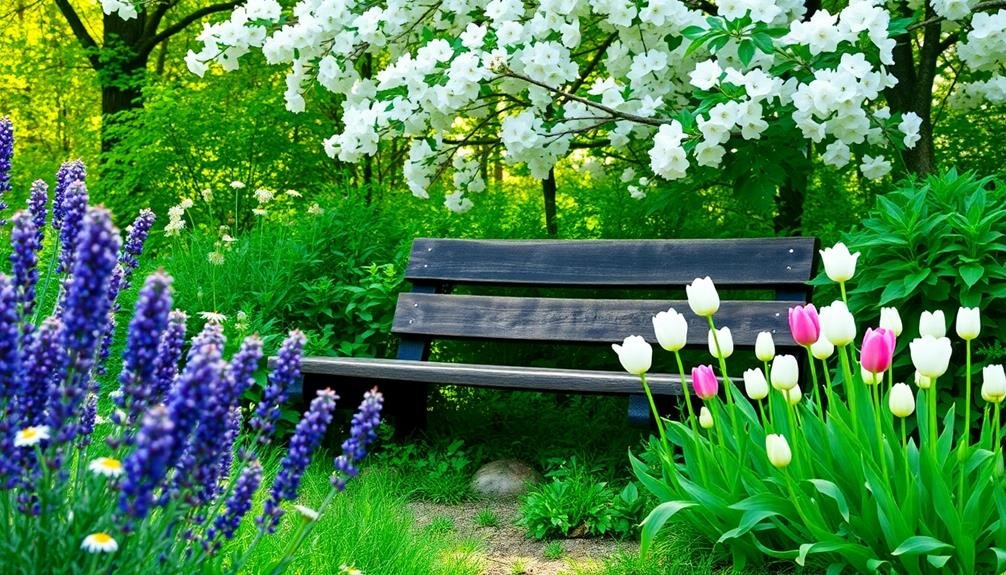
Several spring flowers offer natural anxiety-relieving properties. Lavender, with its soothing scent, tops the list. Plant it in your garden or keep potted lavender indoors to benefit from its calming effects.
Chamomile, known for its relaxing tea, can also be grown at home. Its delicate white flowers and apple-like aroma create a peaceful atmosphere.
Don't overlook the power of jasmine. This fragrant climber not only beautifies your space but also promotes better sleep and reduces anxiety.
For a pop of color and mood-boosting benefits, consider planting pansies. Their cheerful faces can lift your spirits and provide a sense of comfort.
Lilacs, with their sweet fragrance, can help reduce stress and promote relaxation. Plant them near windows or seating areas to enjoy their scent.
Finally, add some lemon balm to your spring garden. This herb's citrusy aroma can improve mood and cognitive function while reducing stress.
Summer's Aromatic Herbs
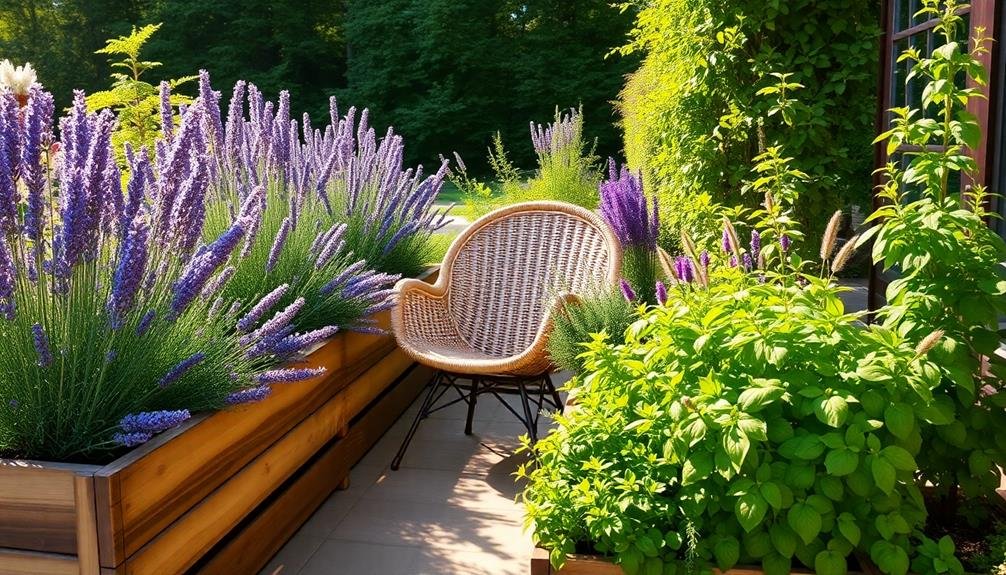
Summer brings a bounty of aromatic herbs that can help soothe anxiety and promote relaxation. You'll find these plants not only add flavor to your dishes but also provide therapeutic benefits through their scents and properties. Cultivating a small herb garden can give you easy access to these natural anxiety remedies.
Several herbs are particularly effective for easing stress and anxiety during the summer months. Lavender, with its calming fragrance, can help reduce tension and improve sleep quality. Lemon balm offers a revitalizing scent that uplifts mood and eases nervousness. Chamomile, known for its gentle properties, can soothe both mind and body when brewed as a tea.
| Herb | Benefits | Usage | Growing Tip |
|---|---|---|---|
| Lavender | Reduces stress, aids sleep | Essential oil, sachets | Well-drained soil |
| Lemon Balm | Uplifts mood, eases tension | Tea, infused water | Partial shade |
| Chamomile | Calms nerves, improves sleep | Tea, bath infusion | Full sun |
| Holy Basil | Lowers cortisol, reduces anxiety | Tea, fresh leaves | Rich, moist soil |
Incorporate these herbs into your daily routine through teas, aromatherapy, or simply by brushing against them in your garden. Their natural properties can provide a gentle, effective way to manage anxiety throughout the summer season.
Fall's Grounding Root Vegetables

As autumn arrives, you'll find solace in the comforting embrace of root vegetables.
These earthy treasures offer more than just sustenance; they provide a grounding effect that can help calm your nerves.
Harvesting Inner Peace
Fall's bounty of root vegetables offers more than just hearty meals; it provides a natural way to ground yourself and find inner peace. As you harvest these earthy treasures, you're not just gathering food; you're cultivating tranquility. The act of digging in the soil connects you to the earth, helping to alleviate anxiety and stress.
Focus on the sensory experience as you pull carrots, beets, and potatoes from the ground. Feel the cool dirt between your fingers and breathe in the rich, earthy scent. This mindful practice can anchor you in the present moment, quieting racing thoughts.
As you clean and prepare your harvest, let the repetitive motions of washing and peeling become a form of meditation. Incorporate these grounding vegetables into your meals with intention. As you chop, roast, or puree them, reflect on the nourishment they'll provide—both physical and emotional.
The act of creating wholesome dishes from your harvest can be deeply satisfying, fostering a sense of accomplishment and self-reliance. By embracing the fall harvest, you're not just feeding your body; you're nurturing your soul.
Earthy Flavors Calm Nerves
The earthy flavors of fall's root vegetables do more than satisfy your taste buds; they can actually help calm your nerves. As you dig into hearty dishes featuring carrots, sweet potatoes, and beets, you're not just nourishing your body but also grounding your mind.
These underground gems are rich in complex carbohydrates, which help regulate serotonin levels in your brain. Serotonin, often called the "feel-good" neurotransmitter, plays a vital role in mood stabilization and anxiety reduction. By incorporating more root vegetables into your diet, you're giving your body the tools it needs to combat stress naturally.
Roasted parsnips and turnips offer a satisfying crunch that can help redirect anxious energy. The act of chewing these fibrous vegetables can be meditative, forcing you to slow down and be present in the moment.
Meanwhile, the earthy aroma of freshly cooked rutabagas can trigger a sense of comfort and nostalgia, further soothing your nervous system.
Don't overlook the humble potato. Its high potassium content helps regulate blood pressure, potentially easing physical symptoms of anxiety like rapid heartbeat.
Winter's Indoor Zen Garden
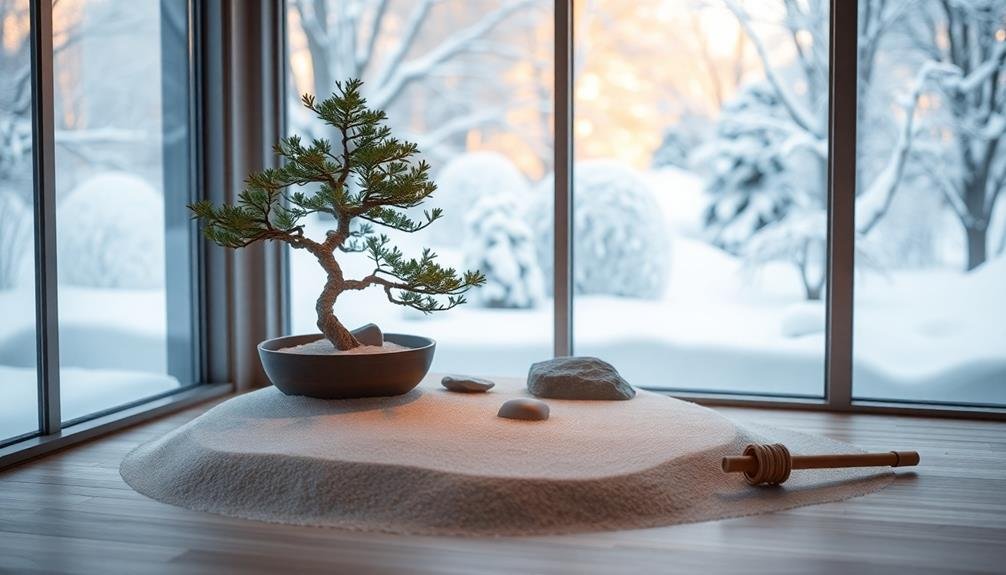
As winter's chill sets in, you can create a calming indoor zen garden to soothe your anxiety.
Start by arranging miniature rocks in patterns that appeal to your sense of balance and harmony.
Complement your rock design with a selection of low-maintenance succulents, which add life and texture to your indoor sanctuary without demanding excessive care.
Miniature Rock Arrangements
Creating miniature rock arrangements for an indoor Zen garden can be a calming winter activity that helps soothe anxiety. You'll find that carefully selecting and placing small rocks, pebbles, and stones can be a meditative process, allowing you to focus on the present moment and let go of worries.
To get started, choose a shallow tray or container as the base for your Zen garden. Fill it with fine sand or crushed quartz, which you'll rake into patterns around your rocks. Select a variety of rocks in different sizes, shapes, and colors to create visual interest. As you arrange them, consider the principles of balance and asymmetry often found in Japanese gardens.
Here are some elements to incorporate for a serene miniature rock arrangement:
- A larger, focal rock representing a mountain or island
- Smaller rocks grouped in odd numbers to symbolize harmony
- Smooth river stones placed in a curved line to mimic a flowing stream
Use a small rake or fork to create patterns in the sand around your rocks, simulating ripples in water or zen circles. This simple act of raking can be incredibly soothing, helping to quiet your mind and reduce stress.
Low-Maintenance Succulent Selection
Alongside your miniature rock arrangement, incorporating low-maintenance succulents can enhance your indoor Zen garden's calming effect.
These hardy plants thrive in winter conditions and require minimal care, making them perfect for anxiety management. Start with a variety of textures and shapes to create visual interest. Consider adding Echeveria, known for its rosette form, or the cascading Burro's Tail for a softer touch.
Haworthia is an excellent choice for low-light areas, while Jade plants offer a tree-like structure.
To maintain your succulents, place them in well-draining soil and water sparingly, allowing the soil to dry completely between waterings. Most succulents prefer bright, indirect light, so position them near a window but out of direct sunlight.
You'll find that caring for these plants can be a meditative practice in itself. As you tend to your succulents, focus on their unique forms and colors. This mindful attention can help ground you in the present moment, reducing anxiety.
Year-Round Anxiety-Reducing Plants
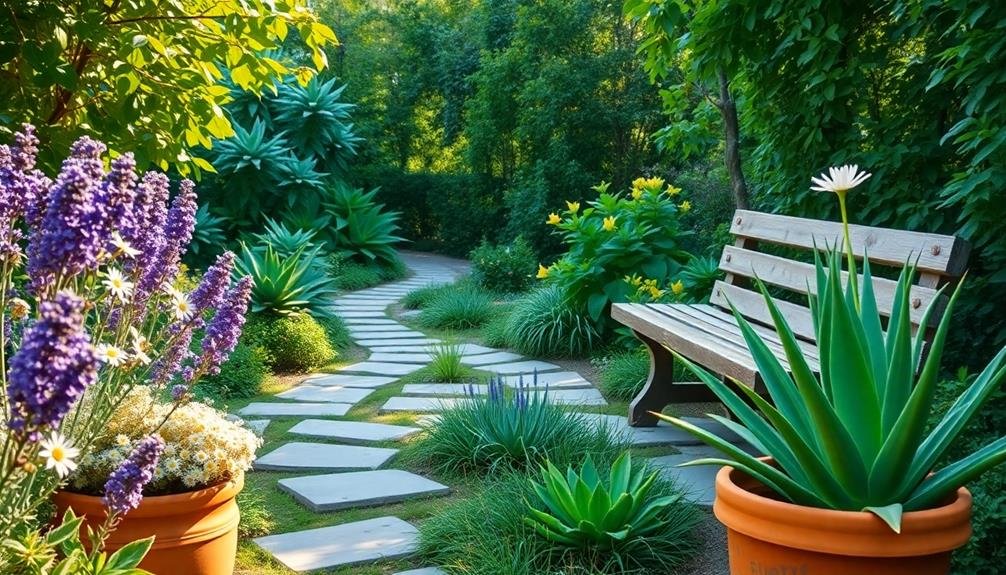
While seasonal plants offer specific benefits, some anxiety-reducing greenery can flourish in your home all year long.
These versatile plants provide consistent stress relief and air-purifying qualities, regardless of the season. Consider adding lavender, snake plants, or aloe vera to your indoor garden for year-round anxiety reduction.
Lavender's soothing scent can help calm your nerves and improve sleep quality. Place a pot on your nightstand or in your living room to enjoy its aromatic benefits.
Snake plants are excellent air purifiers, removing toxins and releasing oxygen at night. They're also low-maintenance, making them perfect for busy individuals.
Aloe vera not only helps with anxiety but also offers medicinal properties for minor burns and skin irritations.
To create a calming atmosphere with these plants:
- Arrange a lavender plant near a sunny window, allowing its delicate purple flowers to catch the light
- Place a tall snake plant in a corner, its striking vertical leaves adding a touch of modern elegance
- Position an aloe vera plant on a kitchen shelf, its plump leaves ready to soothe both mind and body
Mindful Gardening Techniques
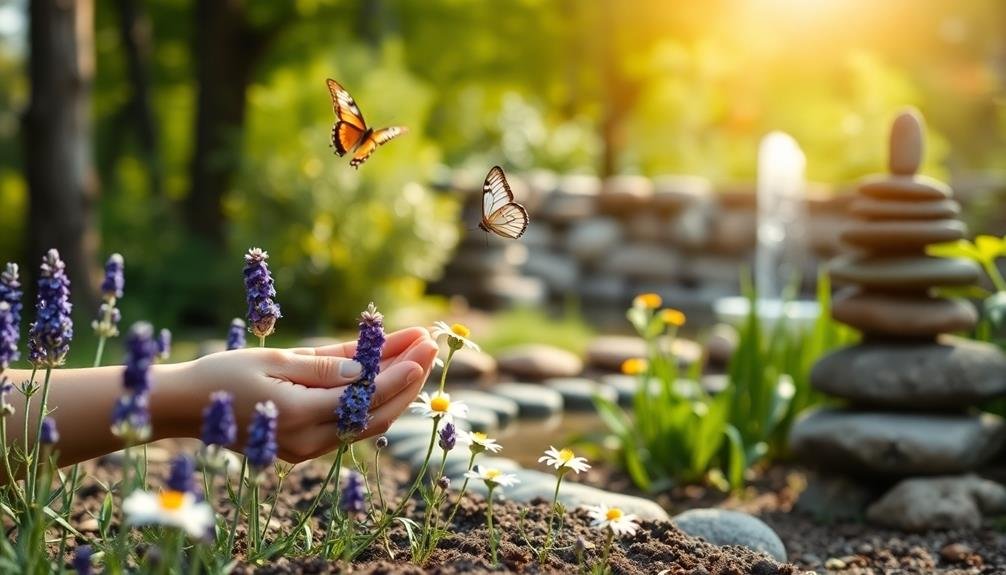
Tranquility can be found in the simple act of tending to your plants. Mindful gardening techniques can help you further reduce anxiety and connect with nature. Start by focusing on your breath as you work, inhaling deeply and exhaling slowly. Notice the textures, scents, and colors around you.
Practice these mindful gardening techniques to enhance your experience:
| Technique | Benefits | How to Practice |
|---|---|---|
| Sensory Awareness | Grounds you in the present | Touch soil, smell flowers, listen to leaves rustling |
| Gratitude | Increases positivity | Thank plants for their beauty and oxygen production |
| Slow Movements | Promotes relaxation | Deliberately slow down your actions while gardening |
As you garden, let go of worries about the future or past. Instead, concentrate on the task at hand, whether it's weeding, pruning, or watering. Embrace imperfections in your garden, seeing them as part of nature's beauty. By cultivating mindfulness in your gardening practice, you'll not only nurture your plants but also nourish your mental well-being, creating a sanctuary of calm in your own backyard.
Harvesting for Emotional Balance

Harmony can be found in the act of harvesting from your anxiety-soothing garden. As you gather the fruits of your labor, you're not just collecting plants; you're reaping emotional benefits. The process of harvesting engages your senses and grounds you in the present moment, offering a respite from anxious thoughts.
When you're ready to harvest, focus on the task at hand. Feel the texture of leaves between your fingers, inhale the aromatic scents, and observe the vibrant colors. This sensory experience can help shift your mind away from worry and into a state of calm awareness.
Remember, harvesting isn't just about the end product; it's about the journey and the connection you've fostered with your garden.
To enhance your harvesting experience, try these techniques:
- Use sharp, clean tools to minimize plant stress and maximize your efficiency
- Harvest in the early morning when plants are most hydrated and flavorful
- Create a ritual around your harvest, such as expressing gratitude for each plant
Frequently Asked Questions
Can Gardening for Anxiety Relief Be Effective for Severe Anxiety Disorders?
Gardening can be beneficial for anxiety relief, even with severe disorders. You'll find it calming and grounding. It's not a cure-all, but it can complement professional treatment. Give it a try and see how it impacts your symptoms.
How Long Does It Take to See Emotional Benefits From Gardening?
You'll often feel immediate emotional benefits from gardening, like stress relief and improved mood. However, for deeper, long-lasting effects, it's best to maintain a regular gardening practice for several weeks or months. You'll notice gradual improvements over time.
Are There Any Plants That Can Worsen Anxiety Symptoms?
While most plants are beneficial, you'll want to avoid those with strong scents if you're sensitive. Certain plants like datura or belladonna can worsen anxiety due to their toxic properties. Stick to calming, non-toxic varieties for the best results.
What Gardening Activities Are Best for Children With Anxiety?
You'll find that gentle, sensory-rich activities are best for anxious children. Try planting colorful flowers, creating fairy gardens, or growing vegetables. These hands-on tasks can be calming and give kids a sense of accomplishment and control.
How Can Apartment Dwellers Create Anxiety-Reducing Gardens in Limited Spaces?
You can create anxiety-reducing gardens in your apartment by using vertical spaces. Hang herb planters, install window boxes, or use balcony railings for trailing plants. Don't forget indoor options like terrariums and small potted plants for your desk.
In Summary
You've now got a year-round plan to cultivate calm through gardening. Whether you're planting spring's soothing florals or tending to winter's indoor zen garden, you're nurturing both plants and your mental well-being. Remember, it's not just about the end result; the act of gardening itself can be incredibly therapeutic. So get your hands dirty, breathe in the earthy scents, and let nature's rhythm guide you towards a more balanced, anxiety-free life.

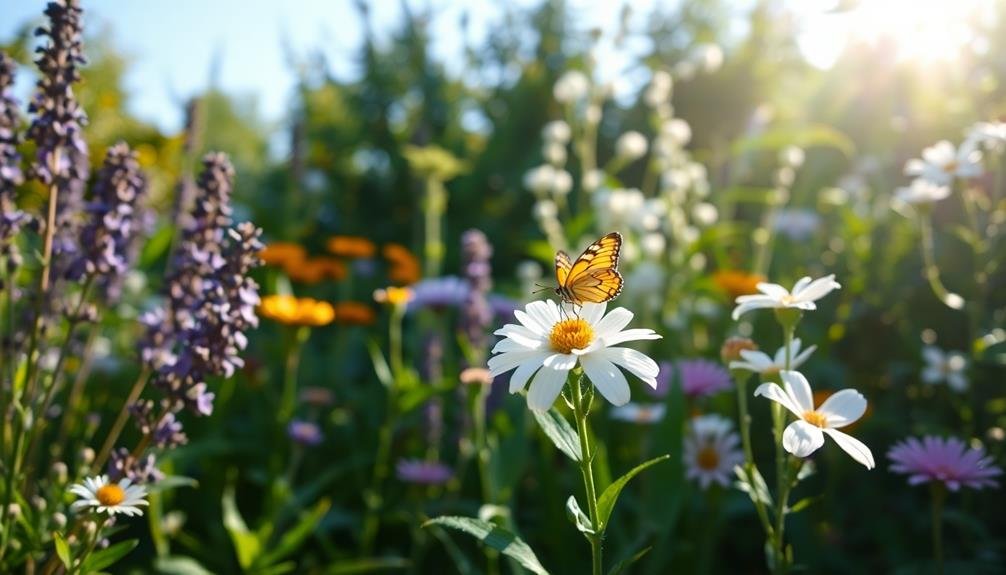
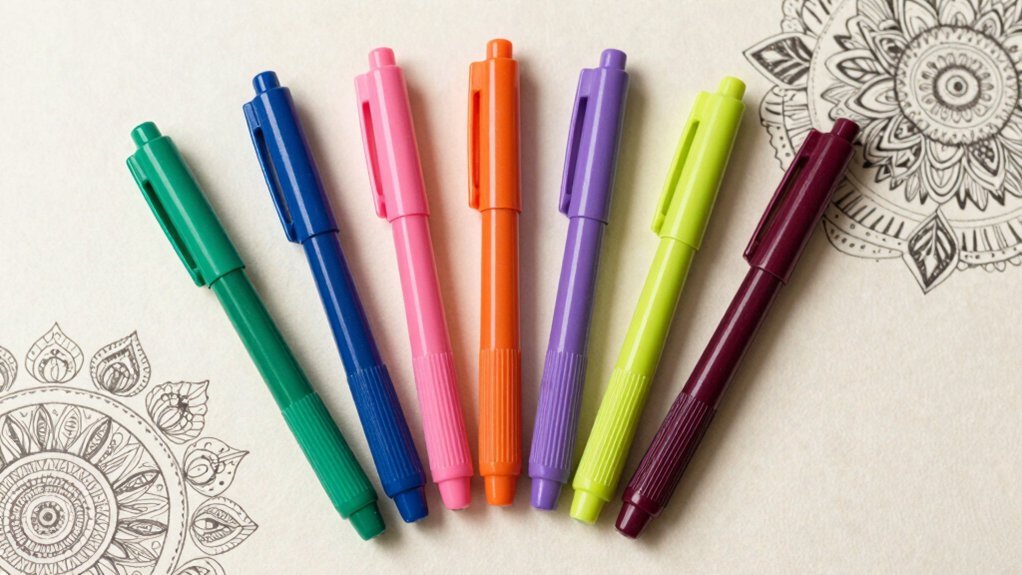
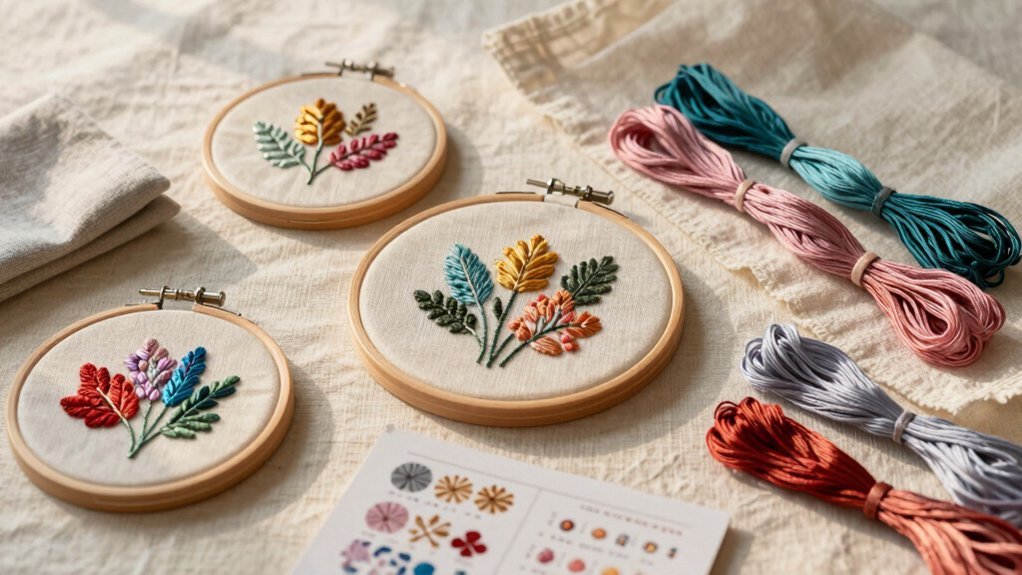

Leave a Reply